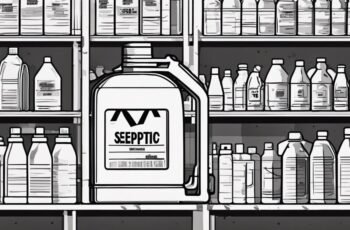You should use septic tank cleaner every 1 to 3 months for routine maintenance to ensure optimal system functionality and longevity. Maintaining a consistent cleaning schedule is important in preventing backups, odors, and failures, which can prolong your septic system's lifespan. Factors like household size, water usage, and solid waste accumulation influence cleaning frequency. Recognizing signs of a full tank, such as slow drains and unpleasant smells, is necessary to prompt action. Different types of cleaners, from DIY solutions to professional services, cater to various septic tank needs. Following a recommended septic tank cleaner schedule will help you safeguard your system and avoid significant issues.
Key Takeaways
- Use septic tank cleaner every 1-3 months for maintenance.
- Professional inspection annually and pumping every 3-5 years.
- Consistent cleaning schedule prevents issues and prolongs lifespan.
- Appropriate products optimize system performance.
- Regular maintenance enhances septic system functionality.
Frequency of Septic Tank Cleaning
Determining the suitable frequency for septic tank cleaning is essential for maintaining peak system performance. Proper maintenance of your septic tank involves regular cleaning to prevent issues such as backups, odors, and system failures. By taking preventative measures and adhering to a consistent cleaning schedule, you can prolong the lifespan of your septic system and avoid costly repairs.
For most households, experts recommend having your septic tank cleaned every 3 to 5 years. However, this can vary depending on factors like the size of your tank, the number of people in your household, and your water usage habits. If you notice any signs of a full tank, such as slow drains, gurgling sounds, or foul odors, it may be necessary to clean your septic tank sooner.
Regular maintenance and timely cleanings are key to ensuring that your septic system operates efficiently. By following a routine cleaning schedule and being aware of potential warning signs, you can keep your septic tank in top condition and prevent issues down the line. To enhance the effectiveness of your septic tank maintenance routine, consider incorporating SEPTIFIX's powerful aerobic bacteria treatment for improved system performance and longevity.
Factors Influencing Cleaning Frequency
To ascertain the appropriate frequency for septic tank cleaning, various factors come into play. Consider the following:
- Household Size: The number of occupants directly impacts the volume of wastewater generated, influencing how quickly the tank fills up.
- Water Usage: Excessive water use can overload the system, requiring more frequent cleanings to prevent backups and maintain water quality.
- Solid Waste: The amount of solid waste entering the tank affects the accumulation of sludge, necessitating more frequent cleanings if high.
- Environmental Impact: Regular cleanings help reduce the release of harmful pollutants into the environment, contributing to better water quality.
- Previous Maintenance: Maintenance history can indicate patterns of usage and potential issues, guiding the frequency of future cleanings.
Signs of a Tank in Need of Cleaning
If you detect a lingering unpleasant smell coming from your septic system, experience sluggish drainage in your sinks and toilets, or find vibrant, excessively green patches in your yard near the drain field, these could be indicators that your septic tank is due for cleaning. These signs should not be overlooked, as they can signal an underlying issue that requires attention. By practicing preventative maintenance and engaging in early intervention, you can address potential problems before they escalate. Regular inspections and being mindful of these warning signs can help you avoid more significant and costly septic system issues down the line. Taking proactive steps to clean your septic tank when needed can ultimately extend its lifespan and ensure its peak functionality. Remember, addressing these signs promptly can save you time, money, and potential headaches in the long run. Prioritizing the health of your septic system through timely cleanings is key to maintaining a smoothly running household.
Different Types of Tank Cleaners
When it comes to maintaining your septic tank, using the right type of cleaner is essential for ensuring peak performance and longevity of the system. Here are some different types of tank cleaners to think about:
- DIY solutions: Homemade remedies like baking soda and vinegar can help in breaking down waste in your septic tank.
- Septic tank additives: These products introduce beneficial bacteria into the tank to aid in the decomposition of solids.
- Enzyme-based cleaners: Enzymes can help break down organic matter in the septic tank, promoting better overall function.
- Chemical cleaners: Some chemical products are designed to target specific issues in the tank, such as excessive grease buildup.
- Professional services: Hiring professional septic tank cleaners can ensure a thorough and effective cleaning process, especially for more complex issues.
Considering the specific needs of your septic system, choosing the right type of cleaner is vital for optimal performance and longevity.
Recommended Septic Tank Cleaner Schedule
Considering the diverse range of cleaners available for septic tank maintenance, establishing a proper cleaning schedule is crucial to the efficient functioning of your system. When it comes to recommended septic tank cleaner schedules, it is essential to follow specific guidelines to safeguard the longevity and effectiveness of your system. To maintain a healthy septic tank, it is generally advised to use cleaning products designed for septic systems on a regular basis. Maintenance tips suggest using these products every 1 to 3 months to prevent the buildup of sludge and scum that can lead to system failures. Additionally, incorporating an annual professional inspection and pumping every 3 to 5 years can further optimize the performance of your septic tank. By adhering to a consistent cleaning schedule and utilizing appropriate cleaning products, you can extend the lifespan of your septic system and avoid costly repairs in the future.

